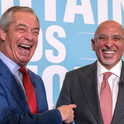Read more by John McTernan: The Republican Party will be relevant again
"For the next generation, focused on the future, the EU is as weird and old-fashioned as having a landline.” That was Steve Hilton, the former senior adviser to David Cameron setting out the modernising Tory case for Brexit in a speech (followed by a Q&A) at Policy Exchange think tank last week. Challenged by the Times' Jenni Russell that he famously doesn’t have a mobile and can only be contacted by landline, Hilton countered that that had been a joke.
His speech was a timely reminder of just how good and stimulating a thinker he is—and what a loss he is to No 10. In the speech, Hilton crisply and clearly set out the modernisers’ agenda.
“We wanted to be open not closed: open to all races and cultures; open on gay rights…”
“We stood for the future not the past—embracing technology and its potential to transform government, public services and the economy…”
“… embracing environmentalism as a concrete act of responsibility to future generations…”
“…and seeking to learn from innovators and pioneers in every sector.”
“We argued that a modern Conservative party had to be for everyone, not just the rich… So we placed a commitment to tackle poverty and its causes at the heart of our policy agenda.”
“We put words into deeds with grassroots actions.”
I wanted to stand up and cheer—this was the Tory Party that Tony Blair made, right down to adopting policies and even his slogans—"future not the past.” How, though, do these values work when applied to the question of leaving the European Union?
The EU was marked down for being a centralising force when modernisation was about devolving power “to the individual and family where possible; then to the neighbourhood, and only where necessary to higher tiers of government.” However, the astute reader will notice the dangling thread of the clause “only where necessary.” In due course, this will unravel Hilton’s pro-Brexit case.
Then the EU was tested against the principle of “open not closed.” Here Hilton’s focus was on immigration. Yes, the EU was open in terms of free movement of labour, but that meant the UK had to welcome unskilled Eastern Europeans and turn away “brilliant Chinese students, Indian mathematicians, Russian scientific geniuses.” There is another crack in the Hilton case here—like him I am a huge supporter of immigration but I don’t think that this is a passionate belief of either the "Leave" campaign or its voters.
What about “future not past”? As already quoted, Hilton slams the EU for being out of date with the “sclerotic governance of Cold War-style blocs, ruled by a central committee.” This is clever but evasive. If Hilton really believed we had no need of “Cold War-style blocs” he would oppose the existence of Nato, and it is evasive because the EU is a trade bloc. And trade is at heart of the weakness in Hilton’s argument—it is an exchange which, by definition, requires trade-offs. Those are what we make within the EU—centralisation is a price worth paying for the savings to British businesses and consumers created by harmonising standards for goods and services across 28 countries. The alternative is not freedom but additional costs.
Trade-offs are, of course, at the heart of politics. If they didn’t exist there would be no need for political parties or their advisers. However as resources—whether human, financial or simply temporal—are not infinite their allocation has to be prioritised. Choices are made about how they are spent across geography, across generations, across class and gender. There are no easy fixes—which is why a Tory Party committed to reducing child poverty will actually increase it by 2020 as a by-product of deficit reduction. That is perfectly legitimate prioritisation by them, but it is a choice.
Hilton as an adviser was, he admits, at times too much of a technocrat. He eschews that now in favour of a technological vision of the future—a move from technocracy to tech. But IT no more abolishes the need for trade-offs than optimism does. We work for a perfect world but we live in an imperfect one.
This returns us to the joke about the EU being as forward-looking as a landline phone—the paradox of that argument is that, in reality, it is those who still depend on landlines, the older generation, who predominantly support Brexit. The younger, “smartphone generation” are three to one in favour of staying in the EU. Why? Because they want the world Hilton yearns for—open not closed, diverse and equal, IT-enabled and internationalised—but they accept the trade-offs necessary for that, the trade-offs at the heart of the EU. And in politics, as in business, as goes youth so goes the nation.
"For the next generation, focused on the future, the EU is as weird and old-fashioned as having a landline.” That was Steve Hilton, the former senior adviser to David Cameron setting out the modernising Tory case for Brexit in a speech (followed by a Q&A) at Policy Exchange think tank last week. Challenged by the Times' Jenni Russell that he famously doesn’t have a mobile and can only be contacted by landline, Hilton countered that that had been a joke.
His speech was a timely reminder of just how good and stimulating a thinker he is—and what a loss he is to No 10. In the speech, Hilton crisply and clearly set out the modernisers’ agenda.
“We wanted to be open not closed: open to all races and cultures; open on gay rights…”
“We stood for the future not the past—embracing technology and its potential to transform government, public services and the economy…”
“… embracing environmentalism as a concrete act of responsibility to future generations…”
“…and seeking to learn from innovators and pioneers in every sector.”
“We argued that a modern Conservative party had to be for everyone, not just the rich… So we placed a commitment to tackle poverty and its causes at the heart of our policy agenda.”
“We put words into deeds with grassroots actions.”
I wanted to stand up and cheer—this was the Tory Party that Tony Blair made, right down to adopting policies and even his slogans—"future not the past.” How, though, do these values work when applied to the question of leaving the European Union?
The EU was marked down for being a centralising force when modernisation was about devolving power “to the individual and family where possible; then to the neighbourhood, and only where necessary to higher tiers of government.” However, the astute reader will notice the dangling thread of the clause “only where necessary.” In due course, this will unravel Hilton’s pro-Brexit case.
Then the EU was tested against the principle of “open not closed.” Here Hilton’s focus was on immigration. Yes, the EU was open in terms of free movement of labour, but that meant the UK had to welcome unskilled Eastern Europeans and turn away “brilliant Chinese students, Indian mathematicians, Russian scientific geniuses.” There is another crack in the Hilton case here—like him I am a huge supporter of immigration but I don’t think that this is a passionate belief of either the "Leave" campaign or its voters.
What about “future not past”? As already quoted, Hilton slams the EU for being out of date with the “sclerotic governance of Cold War-style blocs, ruled by a central committee.” This is clever but evasive. If Hilton really believed we had no need of “Cold War-style blocs” he would oppose the existence of Nato, and it is evasive because the EU is a trade bloc. And trade is at heart of the weakness in Hilton’s argument—it is an exchange which, by definition, requires trade-offs. Those are what we make within the EU—centralisation is a price worth paying for the savings to British businesses and consumers created by harmonising standards for goods and services across 28 countries. The alternative is not freedom but additional costs.
Trade-offs are, of course, at the heart of politics. If they didn’t exist there would be no need for political parties or their advisers. However as resources—whether human, financial or simply temporal—are not infinite their allocation has to be prioritised. Choices are made about how they are spent across geography, across generations, across class and gender. There are no easy fixes—which is why a Tory Party committed to reducing child poverty will actually increase it by 2020 as a by-product of deficit reduction. That is perfectly legitimate prioritisation by them, but it is a choice.
Hilton as an adviser was, he admits, at times too much of a technocrat. He eschews that now in favour of a technological vision of the future—a move from technocracy to tech. But IT no more abolishes the need for trade-offs than optimism does. We work for a perfect world but we live in an imperfect one.
This returns us to the joke about the EU being as forward-looking as a landline phone—the paradox of that argument is that, in reality, it is those who still depend on landlines, the older generation, who predominantly support Brexit. The younger, “smartphone generation” are three to one in favour of staying in the EU. Why? Because they want the world Hilton yearns for—open not closed, diverse and equal, IT-enabled and internationalised—but they accept the trade-offs necessary for that, the trade-offs at the heart of the EU. And in politics, as in business, as goes youth so goes the nation.












